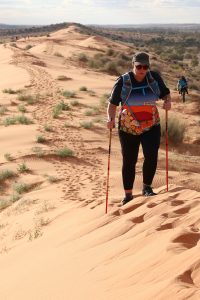Self-discovery in the Sand – Cath Wallis
"Struggling to gain traction and push forward, and yet I must"
Cath Wallis is an Australian ultra-endurance athlete who has completed some of the world’s most iconic foot races – from the back of the field. Her passion is encouraging those who do not consider themselves “athletes” to follow their wildest adventure dreams…
Australian ultra-endurance athlete Cath has completed some of the world’s most iconic foot races – from the back of the field. Her passion is encouraging those who do not consider themselves “athletes” to follow their wildest adventure dreams. She has developed a special love for desert racing – a sport that challenges the mind as much as it challenges the body. From Namibia to Oman and Australia, Cath talks about why desert racing is so special and what it takes to spend a week crossing these pristine wild spaces on your own two feet.
My feet slip with every step. Moving with the soft sand beneath. Struggling to gain traction and push forward. And yet I must. Force each step; push with the poles to achieve forward motion. This is the desert, and as much as it forces me back, I must resist.
This is my first foray into desert foot events was in this same spot. The Australian Simpson Desert in 2017. A latecomer to this sport at age 41, I had only recently discovered the joy of trail events, having completed a 100km single-stage event in my hometown. I was looking for the next challenge and a one-week desert ultramarathon seemed perfect. It was as far away from my ‘normal’ life, working in an office, as you could get. Here, in a place 2000km from the nearest city, requiring two days travel just to get here, was a desert gateway town with only 100 residents, leading into one of the harshest deserts in the world.

Lining up on that start line was the most terrifying experience of my life. Would I be able to cross this desert? Would I be worthy of this challenge? The event began with nearly all 100 residents there to see us off. A loop of the town to the cheers of the crowd and then into the desert. Crossing dune after dune, punctuated only by flat sections with ankle-breaking rocks known as gibber plain. The heat radiated from the sand as the sun rose higher, reaching over 40 degrees in the exposed terrain. Completing a marathon distance before crossing the stage finish and sleeping our first night under the stars, sharing a tent with two strangers who would later become friends.
Desert Running
Support the whole team who put all this together
This is premium stuff! Subscribe for ONLY 99p for ALL online content!
Subscribe
Get right to the heart of ultra-running featuring interviews and podcasts with world class athletes, extraordinary race directors, ultra-running coaches, nutritional experts and in depth race reviews from around the globe!Get your access now








